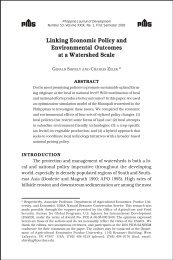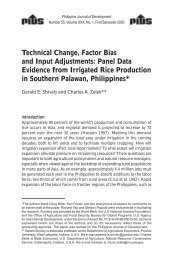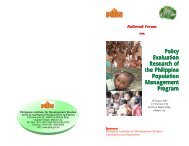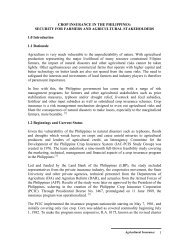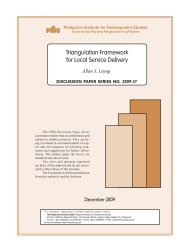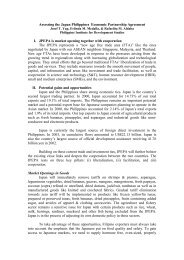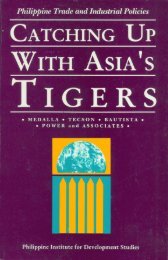Read More - Philippine Institute for Development Studies
Read More - Philippine Institute for Development Studies
Read More - Philippine Institute for Development Studies
Create successful ePaper yourself
Turn your PDF publications into a flip-book with our unique Google optimized e-Paper software.
59<br />
In Cebu: use of SCF gives higher income to corn farmers<br />
Recently, a survey conducted by the Visayas State<br />
University in connection with the ACIAR-funded<br />
project “Bridging the gap between seasonal<br />
climate <strong>for</strong>ecasts (SCFs) and decisionmakers in agriculture”<br />
shows that almost all of the SCF-user respondents<br />
considered climate in their production decisions. In fact,<br />
they considered SCF as having a medium to high<br />
significance in terms of value or contribution to their<br />
farming enterprise. The main reason cited by farmers is<br />
that climate plays a major role in corn production.<br />
The study also indicates that both users and<br />
nonusers of SCF received adequate in<strong>for</strong>mation about<br />
weather/climate. However, a higher proportion of SCFuser<br />
respondents reported receiving more accurate<br />
in<strong>for</strong>mation about climate.<br />
Using SCF innovation in corn production has indeed<br />
provided monetary benefits to corn farmers in Cebu. The<br />
study shows that the mean gross margin during the first<br />
season <strong>for</strong> SCF users was about PhP4,290/ha. This is<br />
comparatively higher than the mean gross margin of<br />
nonusers of SCF (PhP3,080/ha). Computed as the<br />
difference of gross margin between users and nonusers<br />
of SCF, the economic value of using SCF was found to be<br />
PhP1,210/ha. For the second cropping, the mean gross<br />
margin obtained by SCF users was about PhP7,867/ha<br />
while nonusers of SCF realized only PhP3,080/ha, which<br />
indicates that the economic value of using SCF in corn<br />
production decision is about PhP4,787/ha. Findings of this<br />
study imply that there is economic incentive <strong>for</strong> farmers<br />
to use farming innovation such as SCF in corn production.<br />
(SCF Project Updates, June 2008)<br />
The challenge of using seasonal climate<br />
<strong>for</strong>ecasts <strong>for</strong> decisionmaking:<br />
proposed frameworks<br />
Seasonal climate <strong>for</strong>ecasting based on the<br />
interaction of the ocean and atmosphere has<br />
been regarded by experts as one of the premier<br />
advances in the field of atmospheric sciences in the 20 th<br />
century; yet its use in decisionmaking is greatly hampered<br />
by communication and application issues.<br />
In their paper titled “Frameworks <strong>for</strong> using seasonal<br />
climate <strong>for</strong>ecasts <strong>for</strong> decisionmaking,” Peter Hayman,<br />
Kevin Parton, Bronya Alexander, and Canesio Predo 1<br />
explored some ideas on how in<strong>for</strong>mation on probabilistic<br />
<strong>for</strong>ecasts can be used in agricultural decisionmaking.<br />
____________<br />
1<br />
Principal Scientist, South Australian Research and <strong>Development</strong><br />
<strong>Institute</strong> (SARDI); Professor of Economics, Charles Sturt University;<br />
Project Officer, SARDI; and Assistant Professor, Visayas State<br />
University, respectively.<br />
The authors recognized that majority of users find it<br />
difficult to comprehend and use <strong>for</strong>ecasts when they are<br />
presented as probabilities. Many people, when faced with<br />
uncertainty, rely on mental shortcuts which sometimes<br />
lead to biases that impair the decisionmaking process.<br />
An accurate categorical <strong>for</strong>ecast that fits the logic of<br />
IF, THEN, ELSE has been the more appreciated <strong>for</strong>mat by<br />
decisionmakers. An example of this reasoning is, ‘IF the<br />
season ahead is going to be a drought, THEN reduce<br />
inputs, ELSE continue as normal.’<br />
It is common <strong>for</strong> intermediaries such as agronomists<br />
to state that farmers need a categorical <strong>for</strong>ecast because<br />
in the end, they need to make a decision. The media is<br />
also more inclined to sending out categorical statements.<br />
Forecasts <strong>for</strong> El Niño or La Niña episodes, <strong>for</strong> instance, are<br />
respectively simplified to <strong>for</strong>ecasts <strong>for</strong> drought or



